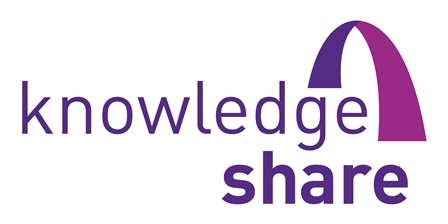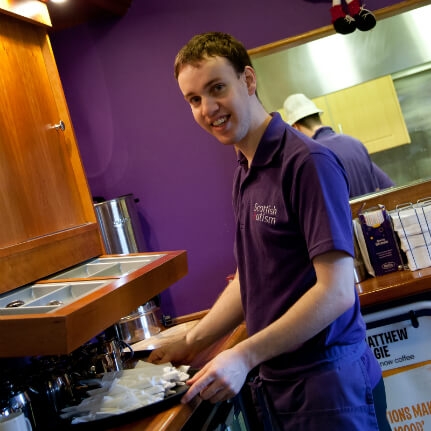Innovate, share, improve: the role of knowledge management in practice development
Kate Leavy, Autism Practice Improvement Advisor, Scottish Autism and Charlene Tait, Director of Autism Practice and Research, Scottish Autism
Scottish Autism has, for almost fifty years, been providing services to autistic children and adults. During this time there have been developments, in terms of the geographical reach, range and nature of services provided. Relatively recently there has been recognition that we are a knowledge rich organisation with the potential to identify and disseminate what constitutes good autism practice and also to contribute to the dearth of research relating to service provision for this population.
A number of strategic initiatives have been developed to enable a systematic approach to harnessing the collective knowledge and expertise of practitioners across the organisation. A culture of organisational improvement and innovation has been supported by adopting principles of Knowledge Management.
The concept of Knowledge Management is based on the recognition that knowledge is an asset that should be harnessed, analysed and used to maximum effect. As a result, knowledge is valued, as are the staff who hold much of this knowledge tacitly. Expertise and knowledge in personalised approaches to supporting individuals is accumulated from the experience of working in services.
The first stage in developing a Knowledge Management Strategy was to undertake an organisation wide knowledge audit of the 600 plus staff within the organisation at the time. A three prong approach was taken to the audit. Focus groups were conducted which addressed perceptions of organisational knowledge and sought views on thought leadership on autism, key influences on practice, philosophy and values. Individual knowledge was audited by adding a series of questions to the Staff Survey that was being undertaken by the organisation’s Human Resources team. Finally an explicit knowledge audit was conducted where all service locations were invited to identify sourced resources. The audit provided three strands of data that were used to directly inform the development of the Knowledge Management Strategy.
Critical to the success of embedding a Knowledge Management culture are approaches that endeavour to involve staff. Scottish Autism placed the development and nurturing of ‘communities of practice’ at the centre of our Knowledge Management Strategy. These communities create opportunities for knowledge exchange between staff, promote collective learning and stimulate reflective practice. Establishing communities that transcend job roles and geographical boundaries strengthens opportunities for meaningful knowledge sharing. The harnessing of practitioner expertise in this way coupled with the support and sponsorship of the Senior Management Team creates an organisational learning culture.
A focus on services and issues that directly impact the lives of autistic people is massively underrepresented in the research literature and indeed does not appear to be a funding priority. Practitioner research has the potential to redress this and therefore had to be a vital strand in a strategy that aims to harness organisational knowledge. The development and delivery of projects that generate practice based evidence that is meaningful and useful to practitioners and have a direct impact on the people we support, not only bring about change and innovation in practice, but provide a vehicle for vibrant staff learning and development opportunities. These outcomes have the potential to bridge the theory to practice gap which often arises due to the failing of learning outwith the practice context.
Due to the heterogeneity of autism and the individualised support offered by Scottish Autism to autistic people, practitioner researchers explore effective strategies and key principles that are based on good autism practice rather than focusing on evaluating named interventions. This has the added value of creating a culture of inquiry where staff can employ research methods to investigate challenges in practice. The well-established principle in our services of personalisation also leads to the development of innovative adaptation of methods and indeed the potential for the generation of new methodologies.
One such project investigated the area of ‘Communication, Voice and Participation’. Practitioner Researchers conducted a series of case studies concentrating on the use of Information Communication Technology (ICT) in decision making and the recording of choice for individuals on the autism spectrum. This project identified good practice examples within the use of visual media in review meetings and case records and the development of service user forums and their role in service development. Another project looked at the topic of ‘Friendship and Social Opportunities in
Autism Services’ by asking autistic individuals and their support staff what meaningful friendships look like for them. A large project concentrated on ‘Supporting People with Autism and Sight Loss’, leading to an increase in the number of individuals undergoing optometry assessment and staff knowledge on how to adapt environments for individuals with sight loss and autism. The outcomes of these projects effect change in practitioner knowledge and practitioner’s direct practice with individuals. It is also important to note that the individuals supported by Scottish Autism are rarely represented in research.
The establishment of an annual staff conference for Scottish Autism has opened up the opportunity for practitioners to share examples from their practice, learn from their peers and gain experience in presenting. Now in its fifth year, a dedicated staff conference ensures a space where staff can deliver workshops that relate to topics that are of relevance to them. ‘Positive Approaches in Reducing Restrictive Practices’, ‘Stress Reduction in Action’ and ‘Later Diagnosis and the Continuing Journey to Flourish’ are just some examples of the thought-provoking workshops produced by staff. As these have foundations in reflective practice, these enable thoughtful discussions and knowledge sharing. The development of ‘Source’, Scottish Autism’s dedicated intranet has been instrumental in the dissemination of information, promoting staff discussion and sharing knowledge.
Source is promoted to staff as a vehicle where they can ‘Connect. Share. Learn’. With their own profile, staff can share their latest work or any relevant updates, gain access to a library of documents to ensure consistency in recording and benefit from a rolling news feed which provides up to date information. Integral to Source are the discussion forums and blogs - here staff can pose questions, offer points of view and suggest solutions to colleagues. With the introduction of Source, Scottish Autism has introduced a virtual community of practice to staff - this provides benefits to all staff but particularly those within more rural and remote locations who are now exposed to the same knowledge sharing opportunities as their peers.
Scottish Autism’s development of a Knowledge Management Strategy is married with its commitment to quality with the employment of our own bespoke practice based self-assessment framework, the Autism Practice Improvement Framework (APIF). APIF was developed by Scottish Autism and is based on our ethical framework and what we believe to be at the core of good autism practice. Staff from across the organisation have evaluated their practice using the framework. This tool has been extremely useful for reflecting on practice, learning from experiences and considering ways to improve. Creativity is promoted during the development of action plans which identify areas of improvement in relation to autism practice. Examples of projects include the development of staff knowledge sharing events within a region, increasing participation in a regional service user forum, and supporting the delivery of review outcomes. The use of APIF evidences a commitment to continuous improvement, while sustaining a focus on autism practice in the context and culture in which it is delivered.
Adopting Knowledge Management principles and practices has been very beneficial for Scottish Autism. The employment of various strategies has ensured staff involvement, promoted staff voice and ownership, reduced the chance of lost assets and developed a multitude of new resources. To date, the experience of Scottish Autism is that our efforts have been driven by the individuality of people on the autism spectrum and the acknowledgment that if we are to continue to deliver excellence we must take full advantage of what each individual has to teach us.
References
Guldberg, K.R., Mackness, J., Makriyannis, E., and Tait, C. (2013). Knowledge management and value creation in a third sector organisation. Knowl. Process Manag. 20, 113–122.
APellicano, L., Dinsmore, A., and Charman, T. (2013). A Future Made Together: Shaping autism research in the UK.





